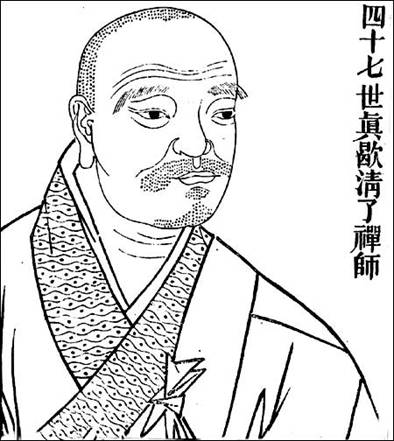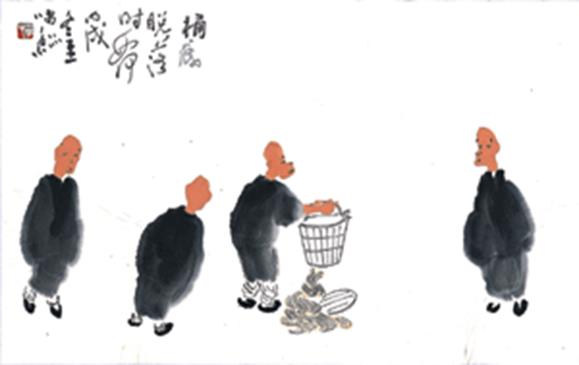ZEN MESTEREK ZEN MASTERS
« Zen főoldal
« vissza a Terebess Online nyitólapjára

真歇清了 Zhenxie Qingliao (1089-1151), aka 長蘆清了 Changlu Qingliao
(Rōmaji:) Shinketsu Seiryō, aka Chōro Seiryō
ZHENXIE QINGLIAO, “CHANGLU”
by Andy Ferguson
In: Zen's Chinese Heritage: The Masters and Their Teachings, Wisdom Publications, pp. 451-454.
ZHENXIE QINGLIAO (1089–1151) was a student of Danxia Zichun. He came from Anchang (in the area of modern Sichuan Province). Zhenxie entered monastic life at the age of eleven and passed his scriptural examinations on the Lotus Sutra at the age of eighteen. He then traveled to Jingzi Monastery in Chengdu, where he continued scriptural study. Later, he set off traveling and visited various famous teachers and sacred mountains, including Mt. Emei and Mt. Wutai.
Danxia asked Zhenxie, “What is the self before the empty eon?”
When Zhenxie began to answer, Danxia stopped him and said, “You’re disturbed now. Go!”
Later, Zhenxie went traveling to an area of modern Shanxi Province and visited Shaolin Temple. He then went to nearby Boyu Peak, the site of the Second Ancestor’s hut, and, while visiting that site, he suddenly experienced enlightenment.
Upon returning to see Danxia, his teacher immediately knew what had transpired.
Before Zhenxie could speak, Danxia slapped him, saying, “You were going to tell me what you know!”
Zhenxie bowed.
The next day, Danxia went into the hall and said to the monks,
The sun shines on a solitary green peak.
The moon reflects in the cold creek water.
The sublime mystery of the ancestors
Is not found in the small mind.Danxia then got down from the seat.
Zhenxie came forward and said, “A talk like you gave today won’t deceive me again.”
Danxia said, “Then explain it to me and we’ll see if you understand.”
Zhenxie was silent.
Danxia said, “I’ll say you caught a glimpse of it.”
Zhenxie then went out.
Later, Zhenxie resided at Changlu Temple where he served as attendant to the abbot, a monk named Zuzhao. Zuzhao subsequently became gravely ill and retired from his position, naming Zhenxie as his successor. Zhenxie served as abbot of Changlu until the years of social unrest accompanying the downfall of the Northern Song dynasty (around 1127). He then traveled to a series of places, including Snow Peak in Fujian and Mt. Jing in Hangzhou.
The dowager empress, Zi Ning, ordered the construction of a temple to honor her ancestors. At the opening ceremony Zhenxie lectured to the assembled crowd, saying: “My previous teacher slapped me and all of my cleverness vanished. I was unable to open my mouth to speak. Was that like all of these fast-talking but shallow fellows we see today? If not, [then let them] take the iron bit in their mouths and suffer the whip, then let’s see what each of them can say.”
Zhenxie entered the hall and addressed the monks, saying, “Climbing to some mountain top, crossing some bridge, rushing about like this is how people these days travel to places high and low. But if they’ve really penetrated it, then without leaving their room their body pervades the ten directions. Not entering any gate, they are always in their room. But if someone doesn’t understand this, then when he feels a draught he goes and hauls a big load of firewood.”
Zhenxie addressed the monks, saying, “Looking everywhere it can’t be found. There’s just one place you can’t search, and there it is attained. What place is that?”
After a long pause, Zhenxie said, “The thief’s body is already exposed.”
Zhenxie said, “Is there anyone who hasn’t been stained by Xuansha? Even if you dip this stain in the four seas, you won’t be able to wash it out.”
A monk asked, “What is the self before the empty eon?”
Zhenxie said, “A white horse enters the flowers and reeds.”
A monk asked Zhenxie, “All the buddhas in the three worlds have turned the great wheel of Dharma into the flames. Has this ceased or not?”
Zhenxie laughed out loud and said, “I have doubts about it.”
The monk said, “Master, why do you have doubts about this?”
Zhenxie said, “The wild flowers’ fragrance fills the road. The secluded bird does not know it’s spring.”
A monk asked, “Without letting go of wind and color, is it still possible to pivot oneself or not?”
Zhenxie said, “Where the stone person walks, there’s no other activity.”

Illustration by 李蕭錕 Li Xiaokun (1949-)One day, Zhenxie went into the kitchen and saw a pot of boiling noodles. Suddenly, the bottom fell out of the pot.
The monks there were crestfallen, saying, “Oh, what a waste!”
Zhenxie said, “An overturned bucket is a joy. Why are you disturbed?”
A monk said, “The master can take delight in it.”
Zhenxie yelled, “Really, it’s a shame to waste a pot of noodles!”
Zhenxie died in [the year 1151]. His stupa, named “Flowering Paulownia Island,” was placed west of the temple. He received the posthumous name “Zen Master Enlightened Emptiness.”
DOC: Poem on Faith in Mind by Sengcan
Translated by Thomas Cleary with Comments by Chan Master Qingliao
PDF